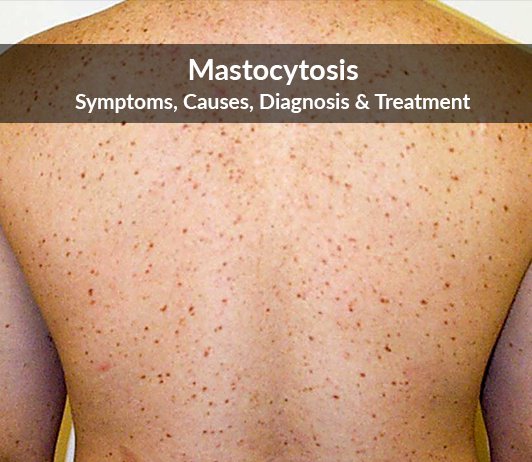Systemic mastocytosis (mas-to-sy-TOE-sis) is a rare disorder that results in too many mast cells building up in your body. A mast cell is a type of white blood cell. Mast cells are found in connective tissues throughout your body. Mast cells help your immune system function properly and normally help protect you from disease.
When you have systemic mastocytosis, excess mast cells build up in your skin, bone marrow, digestive tract or other body organs. When triggered, these mast cells release substances that can cause signs and symptoms similar to those of an allergic reaction and, sometimes, severe inflammation that may result in organ damage. Common triggers include alcohol, spicy foods, insect stings and certain medications.
Symptoms
Signs and symptoms of systemic mastocytosis depend on the part of the body affected by excessive mast cells. Too many mast cells can build up in the skin, liver, spleen, bone marrow or intestines. Less commonly, other organs such as the brain, heart or lungs also may be affected.
Signs and symptoms of systemic mastocytosis may include:
- Flushing, itching or hives
- Abdominal pain, diarrhea, nausea or vomiting
- Anemia or bleeding disorders
- Bone and muscle pain
- Enlarged liver, spleen or lymph nodes
- Depression, mood changes or problems concentrating
The mast cells are triggered to produce substances that cause inflammation and symptoms. People have different triggers, but the most common ones include:
- Alcohol
- Skin irritation
- Spicy foods
- Exercise
- Insect stings
- Certain medications
Causes
Most cases of systemic mastocytosis are caused by a random change (mutation) in the KIT gene. Typically this flaw in the KIT gene is not inherited. Too many mast cells are produced and build up in tissues and body organs, releasing substances such as histamine, leukotrienes and cytokines that cause inflammation and symptoms.
Treatment
Because mastocytosis is a genetic condition, there is no way to prevent it. If you have mastocytosis, you may be able to prevent an attack by avoiding foods, medications, and situations that trigger an outbreak.
Talk to your doctor about the triggers you should avoid. Triggers vary from person to person. Consider wearing a medical alert bracelet to notify others about medicines (such as anesthesia) you cannot take.
The list of some Hereditary Angioedema medicine:



